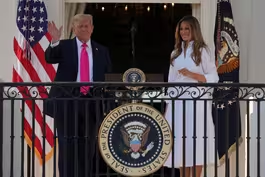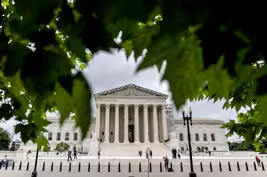
Brooks and Capehart on Trump's total control over Washington
Clip: 7/4/2025 | 12m 7sVideo has Closed Captions
Brooks and Capehart on Trump's total control over Washington
New York Times columnist David Brooks and Washington Post associate editor Jonathan Capehart join John Yang to discuss the week in politics, including the political fallout of the One Big, Beautiful Bill Act, President Trump's total control over Washington and the state of American democracy on this Independence Day.
Problems playing video? | Closed Captioning Feedback
Problems playing video? | Closed Captioning Feedback
Major corporate funding for the PBS News Hour is provided by BDO, BNSF, Consumer Cellular, American Cruise Lines, and Raymond James. Funding for the PBS NewsHour Weekend is provided by...

Brooks and Capehart on Trump's total control over Washington
Clip: 7/4/2025 | 12m 7sVideo has Closed Captions
New York Times columnist David Brooks and Washington Post associate editor Jonathan Capehart join John Yang to discuss the week in politics, including the political fallout of the One Big, Beautiful Bill Act, President Trump's total control over Washington and the state of American democracy on this Independence Day.
Problems playing video? | Closed Captioning Feedback
How to Watch PBS News Hour
PBS News Hour is available to stream on pbs.org and the free PBS App, available on iPhone, Apple TV, Android TV, Android smartphones, Amazon Fire TV, Amazon Fire Tablet, Roku, Samsung Smart TV, and Vizio.
Providing Support for PBS.org
Learn Moreabout PBS online sponsorshipJOHN YANG: To discuss the political fallout of the Republican budget bill and the state of American democracy on this Independence Day, we turn to the analysis of Brooks and Capehart.
That's New York Times columnist David Brooks, and Jonathan Capehart, associate editor of The Washington Post.
Gentlemen, welcome.
Happy Fourth.
JONATHAN CAPEHART: Hey, John.
Happy Fourth.
JOHN YANG: Jonathan, there were more than a couple of times this week it looked like the Big Beautiful Bill wasn't going to make it,like it was sort of teetering on the brink of failure.
But a lot of the people who said there was no way they could support what came over from the Senate switched after talking to the president.
What does this say about the president's hold and influence on the Republican Party now?
JONATHAN CAPEHART: Well, we have always known that his hold on the Republican Party is firm.
What this vote -- and now it's law.
So now what this law says to me is he now has complete and total control of Washington.
Congress, a co-equal, separate branch of government, basically is the staffing arm of the executive.
And the judicial branch, especially the Supreme Court, it seems like with some of their decisions, they are doing things in favor of a lot of some of the extreme things we have seen come out of the administration.
So what we see with this so-called One Big Beautiful Bill Act, which is now the law that they forced to get passed by this arbitrary deadline of July 4, so the president could sign it on the South Lawn, as he just did moments ago, this just says that President Trump -- what happened is what we have been seeing happen since January 20.
He says jump, they say how high, and then they do it for him.
JOHN YANG: David, total control of Washington?
DAVID BROOKS: Yes, I mean, it's true the presidents usually get their big signature initiative, but a couple things are interesting to me.
First, he's on a bit of a roll.
He had the Iran bombing, which did not lead to a wider war.
He won some Supreme Court victories.
Immigration across the southern borders is at decades-long lows.
So the White House is growing on all these victories.
And they pass this thing.
And so that suggests some momentum and some control.
Of course, the shocking thing when he's taken a step back is that this did used to be a party that didn't like deficits.
(LAUGHTER) DAVID BROOKS: And this is adding $3 trillion of deficits.
And so you took a party, a lot of these people who voted for the bill have walked -- said, I wrote -- came to office to shrink the size of government and reduce debt and $3 trillion.
And when I look back on the sort of degradation process that got them to this point, it was the moment when Speaker Johnson started going after the Congressional Budget Office.
For decades, the Congressional Budget Office has been considered and is a nonpartisan, accurate counter of the effects of legislation.
And once the Republicans, especially Speaker Johnson, said the referee, the umpire doesn't matter, that gives permission for self-deception.
And then they could somehow square it internally with themselves, I'm not really increasing debt.
The CBO says that, but who believes that?
So who -- so that was the thing.
Once you walk away from the objective, impartial observer, then you have really -- you give yourself permission to self-deceive.
JOHN YANG: But you talk about -- David, you talk about the people who said that they were standing on principle to oppose this, that they did not want the national debt increase, that this was spending too much money.
Is loyalty and fealty to President Trump more important than that principle?
DAVID BROOKS: Well, I think we have now have about 600 cases of this.
DAVID BROOKS: And the answer is 98.2 percent yes, and so that.
And then the other thing that's interesting to me about this bill is that it's truly regressive.
It's good for the rich and it's bad for working-class folks.
But Democrats -- Republicans have been doing this for a little while.
And Republicans have been winning working-class votes, despite all sorts of pieces of legislation that are regressive in this way.
So how much will -- the Democrats are pretty confident we can say, he's cutting your Medicare -- your Medicaid.
Excuse me.
He's giving tax cuts to zillionaires.
But Democrats have been saying that for 20 or 30 years.
And Donald Trump has been elected.
And even in New York, Mamdani, the Democratic nominee, presumptive, he did not do well among working-class voters.
And he's a socialist giving away free bus rides.
He did well among the people making over $150,000, except for the very rich.
And so there's something weird going on in our country.
Democrats do not seem to be able to capitalize on the fact that Republicans do all these regressive policies.
JONATHAN CAPEHART: Well, one of the things that they did in this now law that is going to aid what you're talking about, the cuts to Medicaid.
They don't kick in, in until 2026, after the midterm elections.
And so Democrats will be out there screaming about how Medicaid has been cut.
But the people they're talking to will say, well, my Medicaid hasn't been cut.
What are they talking about?
So this sleight of hand that's in this now law is also -- it's reprehensible, because by the time people get hit with the full impact of this law, it might be too late for Democrats to capitalize on it.
JOHN YANG: So, Jonathan, you don't think this is going to play a big role in the midterms?
JONATHAN CAPEHART: Oh, absolutely.
It's going to play a big role in the midterms.
There's a difference between playing the sound of Thom Tillis, playing the sound of Senator Tillis, Senator Lisa Murkowski, who actually did an old-fashioned job of squeezing out as much benefit for her constituents, but then voting for a bill that she herself is on video saying is a terrible bill.
All Democrats have to do is cut and paste those videos into ads and then spread out around the country and talk about the thousands of people who are going to lose health care as a result of this law.
DAVID BROOKS: Yes, I mean, maybe they could run Elon Musk ads, things like that.
JONATHAN CAPEHART: Yes.
I do too.
DAVID BROOKS: Yes, I think the one thing I would say if I were a Democrat is, Donald Trump won election on the back of the working class.
He has betrayed you.
You have been betrayed by this guy.
Americans are in a mood where many of them feel betrayed.
And so Republicans have won because they tell a betrayal story.
The elites are betraying you.
But Democrats now have a betrayal story to tell.
And so you got to go with the tide of history.
And the tide of history is like 68 percent, not just Republicans, think the elites have betrayed us.
And now Democrats have a plausible version.
This guy, he said he was going to help you in Youngstown, Ohio.
He's helping Palm Beach.
And that's a story that they could do.
If they hit that populist note a little harder, that might be effective.
JOHN YANG: But polls show that a lot of people aren't even aware of this bill.
JONATHAN CAPEHART: Yes.
JOHN YANG: Are they going to be aware?
Are they going to put it together when Medicaid benefits are cut or they left to get off -- get out of Medicaid?
Are they going to make the connection, do you think?
JONATHAN CAPEHART: I mean, that gets back to what I was saying earlier.
I think you were signing the Washington Post/Ipsos poll.
A third of the folks who were polled had no opinion of the bill.
And two-thirds had heard little or nothing about it.
And so you take that, and then you will have in the 2026 midterm cycle Democrats saying your Medicaid has been cut.
But those folks, a lot of those folks might be people like, wait, my Medicaid hasn't been cut.
So what are they talking about?
And so that's why I think it's terrific what David is suggesting is just pound away on the betrayal, because betrayal -- it usually takes a long time for you to figure out that you have been betrayed.
JOHN YANG: But on the other side, are the tax cuts really going to feel -- they're extensions of cuts.
So people aren't going to see more money in their paycheck.
DAVID BROOKS: They won't see more money, and the effects, the growth effects -- the White House estimates of the growth effects is like we're in Nirvana, like we're all going to be rolling in dough.
But they will produce some growth.
I mean, it's highly stimulative to cut that much taxes.
But the growth effects are, if you look at most of these serious estimates, like under 1 percent, added growth to the economy, sometimes significantly under 1 percent.
So that stuff is not measurable.
It's going to feel like status quo.
There will be a few theatrical things.
And so one of the things Trump talks about all the time is no taxes on tips.
But when you actually look, how much is that?
It's $32 billion, which in this kind of bill is peanuts.
But it's theatrical, no taxes on tips.
Sounds pretty good.
If you're not paying attention, oh, that sounds good, no taxes on tips.
And then there's a slight increase in the child tax credit.
And that's a genuinely good policy, by the way.
And so they're doing that, and there's some baby bonds for people who want to build up life savings.
So these are not big programs, but they're talking points for Republicans.
JONATHAN CAPEHART: And no tax on car loan interest, but only if you buy an American car.
Sorry, John.
JOHN YANG: I was going to say, we had a PBS News/NPR/Marist College poll at this week.
And on this Fourth of July, it's sort of time to reflect on our nation and democracy.
They asked Americans about Americans' openness to people from around the world; 64 percent said it's essential to national identity; 35 percent says it risks the national identity.
How does this square with what President Trump is doing on immigration and mass deportations?
DAVID BROOKS: It's the opposite.
We have been a country of immigrants for since we were before our country.
And Americans still love pluralism and diversity.
I was celebrating Independence Day and the birth of our country yesterday in Milan, but at a Bruce Springsteen concert.
DAVID BROOKS: And he talked about exactly that, about the diversity of the country, the land he loves.
He was so patriotic.
And I felt very moved and tears coming to my eyes.
But so did the Italians.
They love that version of America.
And people -- that is the thing people have always felt magnetized.
We have a ton of Italian Americans in this country.
They literally came here.
And so that's the part of the country that has never changed.
People were upset at the anarchy in the southern border.
But we have never been a country that did not admire people who come here and work hard and make America what it is.
JONATHAN CAPEHART: Yes, I was giving a speech at the Adams Institute in Holland during Trump one, and in the middle -- in the depth of Trump one, when we were worried about our country.
And my host, we were in a cab heading to the event.
And I noticed her lock screen on her phone, the Statue of Liberty.
Here's this Dutch woman with the Statue of Liberty.
It's said to me that America is still a beacon of hope for people around the world.
And that's why that number is at 64 percent.
That's why people look to the United States because of who we are, because of where we come from.
President Biden always said the United States is the only nation that was formed around an idea.
And it's been successful because that idea is something that people from around the world, they can see themselves in it.
And as long as we stay true to that, then, no matter who the president is, we will stay true to our founding and our founding principles, I think.
JOHN YANG: Well, on that also, the idea that -- we asked about a serious threat to the future of democracy, 76 percent said, yes, there is a serious threat, 24 percent said no.
What do you make of that?
DAVID BROOKS: Yes, but there is a serious threat.
But in the winter of 1777, there was a serious threat.
In 1830, when Andrew Jackson did the Indian Displacement Act, there was a serious threat.
1863, that was no joke.
1890s, we had lynchings, we had corruption, 1930s, 1968.
This is a country has built itself through a process of rupture and repair.
We go through these hard periods, but then we repair.
I'm still confident we're going to repair.
JOHN YANG: Confident?
JONATHAN CAPEHART: Absolutely.
And I'm confident just simply because of my own story.
I don't know -- well, we have no time.
(LAUGHTER) JONATHAN CAPEHART: I just looked at the clock.
JOHN YANG: Yes.
JONATHAN CAPEHART: Just read my book, John.
(LAUGHTER) JOHN YANG: Best sales job there.
Jonathan Capehart, David Brooks, thank you very much.
JONATHAN CAPEHART: Thanks, John.
Aquarium creates senior sanctuary for aging penguins
Video has Closed Captions
Clip: 7/4/2025 | 5m 54s | Aquarium creates senior sanctuary for aging penguins (5m 54s)
The long-term risks as extreme heat becomes a new normal
Video has Closed Captions
Clip: 7/4/2025 | 8m 11s | The long-term health risks as extreme heat becomes a new normal (8m 11s)
Marine Corps art exhibit honors triumphs and sacrifice
Video has Closed Captions
Clip: 7/4/2025 | 6m 48s | Marine Corps art exhibit marking 250 years honors its triumphs and sacrifice (6m 48s)
News Wrap: Trump signs One Big, Beautiful Bill Act into law
Video has Closed Captions
Clip: 7/4/2025 | 5m 39s | News Wrap: Trump signs his One Big, Beautiful Bill Act into law (5m 39s)
Supreme Court rulings could have far-reaching consequences
Video has Closed Captions
Clip: 7/4/2025 | 7m 45s | A look at rulings from the Supreme Court term that could have far-reaching consequences (7m 45s)
Why fans are going bananas for Banana Ball
Video has Closed Captions
Clip: 7/4/2025 | 4m 58s | Why fans are going bananas for Banana Ball (4m 58s)
Providing Support for PBS.org
Learn Moreabout PBS online sponsorshipSupport for PBS provided by:
Major corporate funding for the PBS News Hour is provided by BDO, BNSF, Consumer Cellular, American Cruise Lines, and Raymond James. Funding for the PBS NewsHour Weekend is provided by...

















